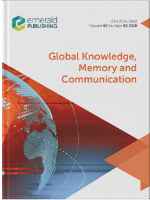
Global Knowledge Memory and Communication
Scope & Guideline
Navigating the Intersection of Memory and Digital Discourse
Introduction
Aims and Scopes
- Knowledge Management and Sharing:
Research on the processes, practices, and tools that facilitate the sharing and management of knowledge within organizations and communities. - Digital Transformation and Literacy:
Exploration of the impact of digital technologies on knowledge practices, including studies on digital literacy, e-learning, and the adaptation of traditional practices to digital formats. - Social Media and Communication Strategies:
Analysis of how social media platforms influence communication behaviors, marketing strategies, and public engagement in various contexts. - Impact of Technology on Learning and Education:
Investigation into how emerging technologies affect educational practices, learning outcomes, and the experiences of educators and students. - Cultural and Ethical Dimensions of Knowledge:
Examination of the implications of knowledge sharing and communication practices across different cultural contexts, including issues related to ethics and social responsibility. - Bibliometric and Scientometric Analyses:
Utilization of bibliometric and scientometric methods to assess trends, patterns, and impacts in scholarly communication and research outputs.
Trending and Emerging
- Artificial Intelligence and Knowledge Management:
Growing interest in how AI technologies can enhance knowledge management practices, including studies on AI's role in automating knowledge sharing and improving decision-making processes. - E-Learning and Digital Education:
Increased focus on the effectiveness and challenges of e-learning platforms, particularly in response to the COVID-19 pandemic, highlighting innovations in digital education. - Social Media Analytics and Impact:
Emerging research on the role of social media in shaping public opinion, community engagement, and marketing strategies, with an emphasis on data analytics and user-generated content. - Sustainability and Ethical Considerations:
A rising trend in examining the ethical implications of knowledge sharing and communication practices, particularly in the context of sustainability and social responsibility. - Health Communication in Digital Spaces:
Intensified exploration of health communication strategies in digital environments, particularly regarding public health messaging and misinformation during crises like the COVID-19 pandemic. - Interdisciplinary Approaches to Knowledge:
An increasing trend towards interdisciplinary research that integrates insights from various fields, including sociology, psychology, and information science, to address complex knowledge issues.
Declining or Waning
- Traditional Library Practices:
Research focusing on conventional library practices is less prevalent, as the field shifts towards digital and innovative solutions in information management. - Print Media and Physical Archiving:
The emphasis on print media and physical archiving has waned, with more attention directed towards digital archiving and the implications of technology on information storage. - Local and Regional Studies:
There is a noticeable decrease in studies focusing solely on local or regional contexts, as the journal increasingly emphasizes global perspectives and comparative analyses. - Static Knowledge Structures:
Research on static models of knowledge management and communication is declining, giving way to dynamic and adaptive frameworks that account for rapid technological changes. - Limited Focus on Traditional Metrics:
The reliance on traditional citation metrics is decreasing, as researchers seek more comprehensive evaluations of impact, including altmetrics and social media engagement.
Similar Journals
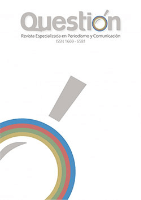
Question
Exploring the dynamics of digital communication.Question is a premier open-access journal published by UNIV NACIONAL PLATA, INST INVESTIGACIONES & COMUNICACION-IICOM, dedicated to advancing scholarship in the field of communication and journalism. Since its inception in 2005, this journal has served as a vital platform for researchers, professionals, and students to disseminate innovative research findings and theoretical discussions that shape contemporary communication practices. Operating out of La Plata, Buenos Aires, Argentina, it engages a global audience by addressing critical topics within communications, including media studies, social communication, and the impact of digital technologies. With its robust commitment to open access, Question ensures that its high-quality content is freely available, fostering a collaborative academic environment and broadening the reach of research in the communications discipline. As a valuable resource, this journal stands at the intersection of academia and practice, inviting contributions that push the boundaries of knowledge in communication.

Micrologus-Nature Science and Medieval Societies
Unveiling the Rich Tapestry of Medieval Knowledge and NatureMicrologus-Nature Science and Medieval Societies, published by SISMEL EDIZIONI GALLUZZO, is an essential scholarly journal that delves into the intricate relationships between nature, science, and medieval societies. With the ISSN 1123-2560 and an E-ISSN of 1123-2560, this journal caters to a diverse academic community interested in the historical intersections of science, philosophy, and culture from the medieval era. Spanning its publication years from 2015 to 2018 and continuing through 2020 to 2024, it has established itself within important academic categories, notably garnering a Q3 ranking in History and a Q4 in History and Philosophy of Science for 2023. Despite being in the lower quartiles of Scopus rankings, the journal plays a crucial role in promoting dialogue and research among scholars focusing on the medieval period's influence on contemporary scientific thought. Researchers, educators, and students are encouraged to explore its articles, which aim to illuminate the complexities of knowledge and culture during one of history's most transformative eras.

Transinformacao
Advancing interdisciplinary dialogue in communication and information sciences.Transinformacao is a distinguished academic journal published by Pontificia Universidade Catolica Campinas in Brazil, focusing on the interdisciplinary fields of Communication, Information Systems, Library and Information Sciences, and Museology. With a commitment to advancing knowledge and fostering scholarly dialogue, the journal spans coverage from 2010 to 2023 and has been categorized in various quartiles, reflecting its growing influence; it holds a Q3 ranking in Communication and Library and Information Sciences, and a Q4 ranking in Information Systems. This positioning demonstrates the journal's relevance within the academic community, appealing to researchers, professionals, and students invested in these dynamic fields. Although it does not currently offer open access publishing, Transinformacao provides critical insights and findings valuable for those pursuing innovative research, striving to enhance practices and understanding within their disciplines. Located in Campinas, SP, the journal continually seeks to engage with emerging trends and robust methodologies, contributing meaningfully to academic discourse.
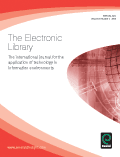
ELECTRONIC LIBRARY
Connecting Scholars with Cutting-edge ResearchELECTRONIC LIBRARY, published by EMERALD GROUP PUBLISHING LTD, serves as a pivotal resource in the realms of Library and Information Sciences as well as Computer Science Applications. Established in 1983 and continuing through 2024, this journal showcases critical research and developments that shape modern information practices and the utilization of electronic resources. With a respectable impact factor positioning it in the Q2 quartile for Library and Information Sciences and Q3 for Computer Science Applications, the journal ranks #57 out of 280 in its field, reflecting its significance within the scholarly community. Authors are encouraged to contribute innovative studies that engage with current challenges and technological advancements, ensuring that the ELECTRONIC LIBRARY remains at the forefront of academic discourse. While the journal does not currently offer open access options, it remains an essential subscription-based resource for researchers, professionals, and students seeking to deepen their understanding of digital libraries and information management.

Revista Comunicacion
Cultivating Critical Conversations in the Heart of CommunicationRevista Comunicacion is a prestigious academic journal published by Escuela Ciencias Lenguaje, dedicated to advancing the field of communication studies. With its ISSN 0379-3974 and E-ISSN 1659-3820, this journal serves as a vital platform for researchers, professionals, and students alike to disseminate cutting-edge research, innovative methodologies, and critical discussions pertaining to communication theory and practice. Though currently not an open-access publication, the journal emphasizes the importance of accessibility and the sharing of knowledge within the academic community. With its focus on the interdisciplinary nature of communication, Revista Comunicacion aims to foster intellectual exchange and collaboration among scholars, thereby contributing to the understanding of communication's pivotal role in contemporary society. Its location in Cartago, Costa Rica, serves as a hub for regional research while also maintaining a global perspective. This journal stands as an essential resource, paving the way for future contributions in the rapidly evolving landscape of communication studies.

Frontiers in Communication
Innovating Dialogues in a Dynamic WorldFrontiers in Communication is a prestigious open-access journal published by FRONTIERS MEDIA SA, dedicated to advancing the field of communication studies. Established in 2016 and situated in Switzerland, this journal has quickly ascended to notable ranks, achieving a Q1 category in both Communication and Social Sciences (miscellaneous) as of 2023. With an impressive Scopus rank, positioning it in the 75th and 78th percentiles for its respective categories, Frontiers in Communication serves as a vital platform for innovative research, interdisciplinary dialogue, and the dissemination of knowledge in the rapidly evolving landscape of communication. The journal emphasizes accessibility and intellectual exchange, providing an open-access format that ensures unrestricted access for researchers, professionals, and students alike. By fostering collaboration and exploration across various communication frameworks, Frontiers in Communication plays a crucial role in shaping the future discourse within the field.

BiD-Textos Universitaris de Biblioteconomia i Documentacio
Advancing Knowledge in Biblioteconomia and DocumentationBiD-Textos Universitaris de Biblioteconomia i Documentacio, published by the Universitat de Barcelona, Servei Publicacions, is a pivotal open-access journal that has been contributing to the fields of Library and Information Sciences since its inception in 1998. With its commitment to disseminating scholarly work broadly, BiD serves as a crucial platform for researchers, professionals, and students seeking to explore the latest trends and developments in biblioteconomia and documentation. Positioned in Q4 category in the Library and Information Sciences as per the 2023 metrics, the journal actively embraces its role in highlighting diverse perspectives and innovations within the discipline. The journal offers an accessible forum for rigorous research, reflective practice, and discourse, particularly relevant as it converges into contemporary challenges and opportunities up to 2024. By remaining open access, it promotes equitable access to knowledge, thus ensuring that vital research reaches a wider audience within the academic community and beyond.

JMIR Pediatrics and Parenting
Empowering parents and professionals with cutting-edge insights.JMIR Pediatrics and Parenting is a leading open-access journal dedicated to advancing research and practices in the fields of pediatrics, perinatology, and health informatics. Published by JMIR Publications, Inc in Canada, this journal has quickly established itself since its inception in 2018, evidenced by its outstanding categorization in 2023, placing it in the Q1 quartile for Pediatrics, Perinatology, and Child Health, and Q2 for both Biomedical Engineering and Health Informatics. With an impressive Scopus rank of 55/330 in Medicine _ Pediatrics and a percentile rank of 83rd, it attracts a global readership of researchers, professionals, and students seeking to explore cutting-edge findings and innovative strategies in child health and parenting practices. The journal's commitment to open access provides a platform for scholarly communication, fostering collaboration and knowledge sharing among the academic community and contributing significantly to the enhancement of pediatric health outcomes.
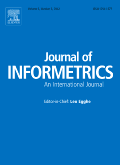
Journal of Informetrics
Leading the Charge in Quantitative Information StudiesThe Journal of Informetrics, published by Elsevier, stands as a leading platform for interdisciplinary research in the realms of Applied Mathematics, Computer Science Applications, Library and Information Sciences, Management Science, Operations Research, Modeling and Simulation, and Statistics. Boasting an impressive 2023 impact factor that ranks it in the Q1 category across multiple disciplines, the journal features a robust Scopus ranking of 38/280 in Library and Information Sciences, placing it in the 86th percentile. This esteemed journal, headquartered in the Netherlands, operates without open access, ensuring a curated selection of high-impact research. Since its inception in 2007, the Journal of Informetrics has been pivotal in advancing knowledge and fostering academic discourse, making significant contributions to the study of information metrics and analytics, thereby appealing to researchers, professionals, and students eager to stay at the forefront of this dynamic field.
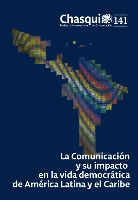
Chasqui-Revista Latinoamericana de Comunicacion
Innovating Communication Research Across Latin AmericaChasqui-Revista Latinoamericana de Comunicación is a distinguished academic journal dedicated to the field of communication in Latin America. Published by CENTRO INT ESTUDIOS SUPERIORES COMUNICACION AMER LATINA-CIESPAL, this journal has been an Open Access resource since 1972, promoting the dissemination of knowledge and fostering scholarly dialogue across diverse communication disciplines. With its ISSN of 1390-1079 and E-ISSN of 1390-924X, Chasqui invites researchers, professionals, and students to explore a wide range of topics, from media studies to intercultural communication, contributing to the understanding and advancement of communication practices in the region. The journal not only supports the growth of academic inquiry but also encourages the publication of innovative research that addresses contemporary issues faced in the communication landscape of Latin America. With its enduring commitment to accessibility and scholarly excellence, Chasqui serves as a vital platform for voices seeking to shape the future of communication studies.